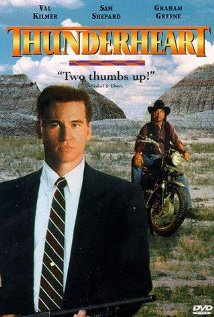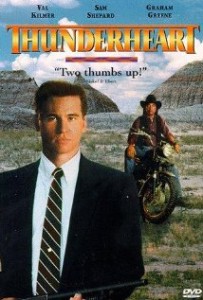“Have you ever met Val Kilmer? I hear he’s a complete bastard.”
So Father Ted asks Beverley Hills-based Father Buzz Cagney. And, if Hollywood lore is anything to go by, Kilmer really is a complete bastard. Tales of his ‘difficult’ behaviour are legendary. A quick Google search will bring up pages and pages of stories about his megalomaniacal , bizarre and sometimes even violent on-set behaviour. After so much berating of assistant directors and devouring of locusts (read the stories) coupled with diminishing box-office returns, Hollywood eventually seemed to get sick of Kilmer. He was cast only in straight-to-dvd duffers and seems to have become something of a bloated joke.
However, it’s worth remembering that, amongst the border-line psychotic behaviour, the weight gain and the bad career choices, there were some genuinely good performances. ‘The Doors’ was a truly terrible film, but Kilmer’s performance was full-blooded, if held back by Oliver Stone‘s determination to make an aggrandising paean rather than a genuine biopic. His turn as the tubercular Doc Holliday stole the show in ‘Tombstone’ and, best of all for me, in 1992 there was Michael Apted‘s ‘Thunderheart’.
In ‘Thunderheart’, Kilmer plays Ray Levoi, an F.B.I. agent with Sioux heritage, sent to help investigate a murder on an Indian Reservation in South Dakota. The Feds are finding it difficult to gather information from the locals, and Ray is sent there to appease them, in the hope that having ‘one of their own’ will help the investigation. But Ray is a man deeply ashamed of his roots and the alcoholic Sioux father who drank himself to death when Ray was a child. When Ray arrives on the reservation, he is mentored by Frank Coutelle, played by Sam Shepherd, an grizzled, old-school agent. Far from gaining the trust of the locals, Ray aggressively sets about alienating them as he overcompensates for the sense of shame he feels over his heritage. In particular he clashes repeatedly with local sheriff Walter Crow Horse, played by Graham Greene.
As the investigation moves on, and as he finds himself spending time with Walter and local activist Maggie Eagle Bear (Sheila Tousey) Ray begins to sense that things might not be quite as they seem, and that perhaps Coutelle is not to be trusted.
Released in the same year as the higher profile ‘The Doors’, ‘Thunderheart’ passed by pretty much unnoticed, receiving a relatively small cinema release and favourable, if not exactly enthusiastic reviews. But watch the two of them now, and there is no doubt which is the better film (unless you’re one of those people who actually still consider Jim Morrison a poet). While Kilmer’s work in ‘The Doors’ was fiercely committed, here it is far more nuanced, as Ray segues from all-American douche bag (a facet of Ray’s character one suspects Valerie didn’t have to do much method research for) to a man struggling to come to terms with his own heritage and identity.
But this is far from a one-man show. Shepherd, as always, is brilliant. Though not on screen that often, his presence is always felt, scheming duplicitously in the background. But the real emotional anchor of Ray’s journey is his relationship and burgeoning friendship with Walter. Two years after his appearance in ‘Dances With Wolves’, Greene is superb, imbuing Walter with humour, integrity and a steely determination to uncover the truth, while steering Ray through his awakening, in what is one of my favourite on screen “bromances”.
Kilmer’s peak, both commercially and artistically, was reached and breached within a few years, after which his career hit a downward slope that was interrupted only by a brief early noughties mini revival as Kilmer took roles in low-budget indie fare like ‘Wonderland’ and David Mamet‘s ‘Spartan’. Apted, having already made films like ‘Gorillas In The Mist’, has maintained a successful film and TV career, directing Bond and Chronicles of Narnia movies, as well as multiple episodes of popular shows like ‘Rome’ and ‘Ray Donovan’. Apted is one of many directors who have shared stories of how much of a struggle it was to work with Kilmer, though it doesn’t show here.
Neither Kilmer nor Apted have ever bettered this film.





